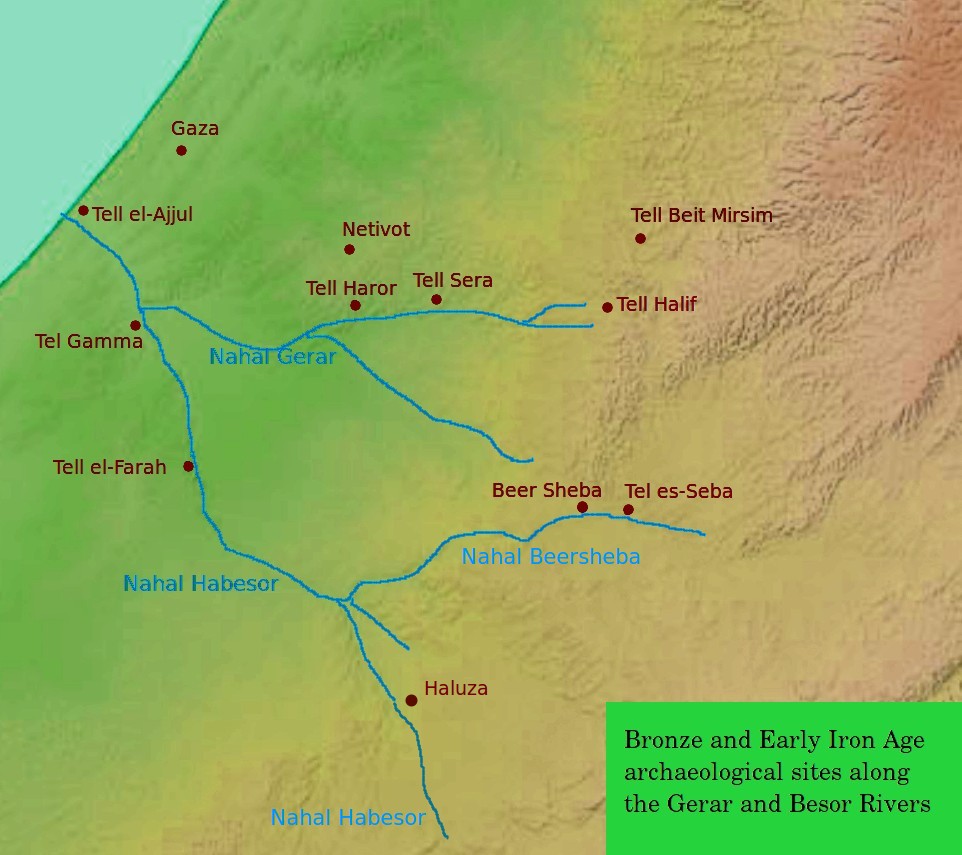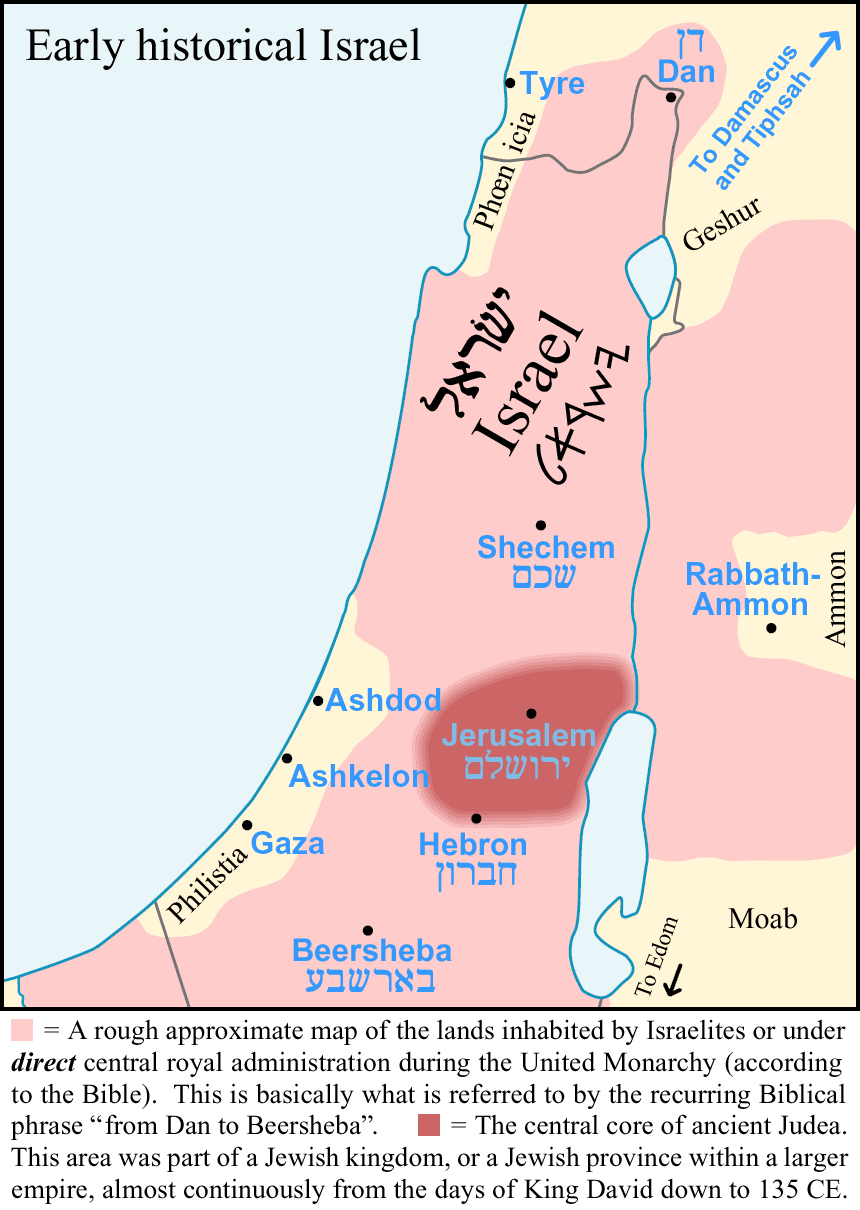|
Yohanan Aharoni
Yohanan Aharoni (; 7 June 1919 – 9 February 1976) was an Israeli archaeologist and historical geographer, chairman of the Department of Near East Studies and chairman of the Institute of Archaeology at Tel Aviv University. Life Born to the Aronheim family, in Germany on 7 June 1919, Aharoni immigrated to Mandatory Palestine in 1933. He studied at the Hebrew Reali School in Haifa, and later at the Mikve Yisrael agricultural school. He married Miriam Gross and became a member of kibbutz Alonim, where he lived until 1947. Career Aharoni studied archaeology at the Hebrew University of Jerusalem and began to teach there in 1954. By 1966, he became a professor at the university. However, in 1968, he moved to Tel Aviv University and replaced Shemuel Yeivin as chairman of the Department of Near East Studies. Together with his student Moshe Kochavi, his academic staff from his archaeological projects, and the teaching staff of the Department, Aharoni established the Tel Aviv Uni ... [...More Info...] [...Related Items...] OR: [Wikipedia] [Google] [Baidu] |
Har Karkom (997009157548905171)
Mount Karkom, also Har Karkom ( "Mountain of Saffron"), from Arabic language, Arabic Jabal Karkoum (also Jabal Ideid), is a mountain in the southwest Negev desert in Israel, halfway between Petra and Kadesh Barnea. Identification with Mount Sinai Presuming that the Israelites travelled across the Sinai Peninsula towards Petra in a fairly straight line, a number of scholars have contemplated the possibility of Har Karkom being the biblical Mount Sinai. Following this theory, Emmanuel Anati archaeology, excavated at the mountain, and discovered that it was a major Paleolithic cult centre, with the surrounding plateau covered with shrines, altars, stone circles, stone pillars, and over 40,000 rock art, rock engravings. Although Anati, on the basis of his findings, advocates the identification of Har Karkom with Mount Sinai,Anati, Emmanuel (2001). ''The riddle of Mount Sinai: archaeological discoveries at Har Karkom''. the peak of religious activity at the site may date to 2350-2000 ... [...More Info...] [...Related Items...] OR: [Wikipedia] [Google] [Baidu] |
Tel Be'er Sheva
Tel Sheva () or Tel Be'er Sheva (), also known as Tell es-Seba (), is an archaeological site in the Southern District of Israel, believed to be the site of the ancient biblical town of Beer-sheba. The site lies east of modern Beersheba and west of the Bedouin town of Tel Sheva. Tel Sheva has been preserved and made accessible to visitors in the Tel Be'er Sheva National Park (). Etymology The Hebrew name of Beersheba is derived from , meaning a , and , meaning or . History Beer-sheba is mentioned 33 times in the Hebrew Bible. It is often used when describing the borders of the Land of Israel: " From Dan to Beersheba". It was the site of many patriarchal narratives: Abraham dwelt at Beer-sheba (), Abraham and Abimelech entered a covenant at Beer-sheba (), and Abraham planted a tamarisk tree at Beer-sheba (). The Lord spoke to both Isaac and Jacob, Abraham's son and grandson respectively, at Beer-sheba (). Two biblical wells were located in Beer-sheba: Abraham's well, seiz ... [...More Info...] [...Related Items...] OR: [Wikipedia] [Google] [Baidu] |
Academic Staff Of Tel Aviv University
An academy (Attic Greek: Ἀκαδήμεια; Koine Greek Ἀκαδημία) is an institution of tertiary education. The name traces back to Plato's school of philosophy, founded approximately 386 BC at Akademia, a sanctuary of Athena, the goddess of wisdom and Skills, skill, north of Ancient Athens, Athens, Greece. The Royal Spanish Academy defines academy as scientific, literary or artistic society established with public authority and as a teaching establishment, public or private, of a professional, artistic, technical or simply practical nature. Etymology The word comes from the ''Academy'' in ancient Greece, which derives from the Athenian hero, ''Akademos''. Outside the city walls of Athens, the Gymnasium (ancient Greece), gymnasium was made famous by Plato as a center of learning. The sacred space, dedicated to the goddess of wisdom, Athena, had formerly been an olive Grove (nature), grove, hence the expression "the groves of Academe". In these gardens, the philos ... [...More Info...] [...Related Items...] OR: [Wikipedia] [Google] [Baidu] |
Jewish Emigrants From Nazi Germany To Mandatory Palestine
Jews (, , ), or the Jewish people, are an ethnoreligious group and nation, originating from the Israelites of History of ancient Israel and Judah, ancient Israel and Judah. They also traditionally adhere to Judaism. Jewish ethnicity, religion, and community are highly interrelated, as Judaism is their ethnic religion, though it is not practiced by all ethnic Jews. Despite this, religious Jews regard Gerim, converts to Judaism as members of the Jewish nation, pursuant to the Conversion to Judaism, long-standing conversion process. The Israelites emerged from the pre-existing Canaanite peoples to establish Kingdom of Israel (Samaria), Israel and Kingdom of Judah, Judah in the Southern Levant during the Iron Age.John Day (Old Testament scholar), John Day (2005), ''In Search of Pre-Exilic Israel'', Bloomsbury Publishing, pp. 47.5 [48] 'In this sense, the emergence of ancient Israel is viewed not as the cause of the demise of Canaanite culture but as its upshot'. Originally, J ... [...More Info...] [...Related Items...] OR: [Wikipedia] [Google] [Baidu] |
People From The Province Of Brandenburg
The term "the people" refers to the public or common mass of people of a polity. As such it is a concept of human rights law, international law as well as constitutional law, particularly used for claims of popular sovereignty. In contrast, a people is any plurality of persons considered as a whole. Used in politics and law, the term "a people" refers to the collective or community of an ethnic group or nation. Concepts Legal Chapter One, Article One of the Charter of the United Nations states that "peoples" have the right to self-determination. Though the mere status as peoples and the right to self-determination, as for example in the case of Indigenous peoples (''peoples'', as in all groups of indigenous people, not merely all indigenous persons as in ''indigenous people''), does not automatically provide for independent sovereignty and therefore secession. Indeed, judge Ivor Jennings identified the inherent problems in the right of "peoples" to self-determination, as ... [...More Info...] [...Related Items...] OR: [Wikipedia] [Google] [Baidu] |
1976 Deaths
Events January * January 2 – The International Covenant on Economic, Social and Cultural Rights enters into force. * January 5 – The Pol Pot regime proclaims a new constitution for Democratic Kampuchea. * January 18 – Full diplomatic relations are established between Bangladesh and Pakistan 5 years after the Bangladesh Liberation War. * January 27 ** The United States vetoes a United Nations resolution that calls for an independent Palestinian state. ** The First Battle of Amgala breaks out between Morocco and Algeria in the Spanish Sahara. February * February 4 ** The 1976 Winter Olympics begin in Innsbruck, Austria. ** The 7.5 Guatemala earthquake affects Guatemala and Honduras with a maximum Mercalli intensity of IX (''Violent''), leaving 23,000 dead and 76,000 injured. * February 9 – The Australian Defence Force is formed by unification of the Australian Army, the Royal Australian Navy and the Royal Australian Air Force. * February 13 – General ... [...More Info...] [...Related Items...] OR: [Wikipedia] [Google] [Baidu] |
1919 Births
Events January * January 1 ** The Czechoslovak Legions occupy much of the self-proclaimed "free city" of Bratislava, Pressburg (later Bratislava), enforcing its incorporation into the new republic of Czechoslovakia. ** HMY Iolaire, HMY ''Iolaire'' sinks off the coast of the Hebrides; 201 people, mostly servicemen returning home to Lewis and Harris, are killed. * January 2–January 22, 22 – Russian Civil War: The Red Army's Caspian-Caucasian Front begins the Northern Caucasus Operation (1918–1919), Northern Caucasus Operation against the White Army, but fails to make progress. * January 3 – The Faisal–Weizmann Agreement is signed by Faisal I of Iraq, Emir Faisal (representing the Arab Kingdom of Hejaz) and Zionism, Zionist leader Chaim Weizmann, for Arab–Jewish cooperation in the development of a Jewish homeland in Palestine (region), Palestine, and an Arab nation in a large part of the Middle East. * January 5 – In Germany: ** Spartacist uprising in ... [...More Info...] [...Related Items...] OR: [Wikipedia] [Google] [Baidu] |
Michael Avi-Yonah
Michael Avi-Yonah (; September 26, 1904 – March 26, 1974) was an Israeli archaeologist and historian. During his career he was a Professor of Archaeology at the Hebrew University of Jerusalem and served as secretary of Israel's Department of Antiquities. Biography Born in Lemberg, Austria-Hungary (today Lviv, Ukraine), Avi-Yonah moved to Mandatory Palestine with his parents in 1919 during the Third Aliyah. He first studied at Gymnasia Rehavia in Jerusalem, then he went to England and studied history and archeology at the University of London. After returning to Jerusalem, he studied at the British School of Archaeology in Jerusalem. His first archaeological excavations were at Tel el-Ajjul near Gaza, and the Jerusalem Ophel. At the end of his studies, he joined the Department of Antiquities of the British government of Palestine. He worked as a librarian and archivist. After the independence of the state of Israel, he became secretary of the Department of Antiquities. I ... [...More Info...] [...Related Items...] OR: [Wikipedia] [Google] [Baidu] |
Macmillan Bible Atlas
The Macmillan Bible Atlas is a book on the geography, civilizations and cartography of the Holy Land. It describes the movements of biblical characters, trade routes and battles. It also refers to archaeological excavations; illustrations of artifacts; and a comparative chronology of early civilizations that relate to the Bible. of the Macmillan Bible Atlas When it was first published in 1968, the called it "one of the year's most outstanding reference books". The third edition was published in 1993, after which a fourth (2002) and fifth (2011) edition appeared under a new title, Carta Bible Atlas. The Macmillan Bible Atlas was created primarily by |
Joseph Naveh
Joseph Naveh (Hebrew: יוסף נוה; January 21, 1928 – November 21, 2011) was an Israeli linguist, paleographer, epigraphist, and archaeologist. He was a professor at the Hebrew University of Jerusalem and a prominent scholar in the field of West Semitic scripts and ancient inscriptions. Early life and education Naveh was born into a Jewish family in Mukachevo, Czechoslovakia, a city with a complex history of changing sovereignties. At the time of his birth, the city was under Czechoslovakian administration, but reverted to Hungarian control in 1938. He attended a Hebrew school in Mukachevo and later immigrated to Mandatory Palestine after World War II. In 1948, he joined the Israel Defense Forces. He studied Bible, Jewish history, and archaeology at the Hebrew University of Jerusalem. Career From 1955 to 1971, Naveh worked at the Israel Department of Antiquities, serving as district archaeologist from 1958. He participated in excavations at sites such as En Gedi a ... [...More Info...] [...Related Items...] OR: [Wikipedia] [Google] [Baidu] |
Bialik Institute
Bialik Institute () is a research institution and publishing house, mostly dealing with the history and culture of the Hebrew language. It was established in 1935 by the World Zionist Executive and the Executive of the Jewish Agency and named after the Hebrew poet Hayim Nahman Bialik. Its works are mostly published in Hebrew and in English. Among the Bialik Institute's most notable publications are: * ''Encyclopaedia Biblica'' - an encyclopedia of the Hebrew Bible in eight volumes (1942−1982), and ''The Biblical Encyclopaedia Library''—a series of books on Semitic languages, Biblical criticism and history of the Middle East. * A complete collection of David Avidan's poems in four volumes (2008−2011) * A complete collection of Uri Zvi Grinberg's poems (1991) * The ''Kvar Series'' of Modern Hebrew poetry Modern Hebrew poetry is poetry written in the Hebrew language. Moshe Chaim Luzzatto is considered one of the earliest modern Hebrew poets. History Modern Hebrew poetry w ... [...More Info...] [...Related Items...] OR: [Wikipedia] [Google] [Baidu] |





